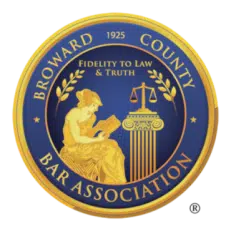 Florida’s beautiful weather and iconic attractions make it a popular destination for motorcycle riders. The feeling of freedom and exhilaration of hitting the open road on your favorite bike is hard to match. However, motorcycles must be equipped adequately for safety.
Florida’s beautiful weather and iconic attractions make it a popular destination for motorcycle riders. The feeling of freedom and exhilaration of hitting the open road on your favorite bike is hard to match. However, motorcycles must be equipped adequately for safety.
Your motorcycle’s small size and lack of a protective outer shell could leave you vulnerable to severe injuries or death. Fortunately, protecting yourself with the proper safety gear can reduce your chance of injury.
Our experienced Ft. Lauderdale motorcycle accident lawyers at Eltringham Law Group explain Florida’s legal requirements for a motorcycle and how this equipment protects you on the road.
Florida Motorcycle Requirements
Florida law requires motorcycles and their riders to meet specific requirements for safety gear to reduce severe injuries and deaths from accidents. Failing to comply with the law usually will not affect your liability or compensation claim, but the police may pull you over and write you a ticket.
Helmets
Head injuries are among the most severe and deadly injuries from motorcycle accidents.
Wearing a helmet can significantly reduce the severity of head injuries from a crash.
Florida law requires those who drive or ride on a motorcycle to wear securely fastened protective headgear that complies with Federal Motorcycle Vehicle Safety Standard 218.
However, if you are over 21 and have at least $10,000 in medical insurance covering injuries from motorcycle accidents, you don’t have to wear a helmet.
If you’re over 16, you can ride without wearing a helmet on small motorcycles with 50 cubic centimeters or less displacement and a maximum of 2 brake horsepower that cannot go faster than 30 miles per hour. Despite these exceptions, due to the potential of severe injuries, consider wearing a helmet, even when the Florida motorcycle requirements don’t require you to.
The decision to ride without a helmet not only creates a substantial risk of serious injury but also gives the at-fault driver a possible legal defense of comparative fault or negligence even though the accident was otherwise 100% their fault. This technical legal argument is premised upon the notion that the helmetless rider is, at least, partially responsible for the severity of their injuries.
In other words, the injuries were either preventable or would not have been as bad with a helmet on. This is especially true in head & neck injury cases. Unfortunately, the amount of the rider’s financial recovery may be reduced by the percentage of fault attributed to them. Worse yet, under Florida law the rider may completely lose their right to any financial recovery if they are found to be 50% or more at fault for causing the accident. This is just one of the many reasons why it is so important to hire an experienced motorcycle accident lawyer if you have been injured in a motorcycle accident.
Mirrors
Florida motorcycle mirror law requires all motorcycles to have mirrors on both sides of the vehicle and a rear-view mirror. Drivers must be able to see at least 200 feet to the rear of their motorcycles in the mirrors. This helps you make lane changes safely and spot any other vehicles on the road that may be a safety issue.
Lights
Many motorcycle crashes occur because drivers of other vehicles can’t see motorcycles or larger vehicles. Lights help motorcycle drivers know the road and other cars better and help other drivers see motorcycles. This can reduce accidents caused by vehicles turning in front of motorcycles or changing lanes into them.
Motorcycles must have working headlights, reflectors, tail lights, and turn signals. Your headlights must always be on when operating your bike, even during daylight.
Florida motorcycles require either a single or double headlamp. It must be intense enough to illuminate a person or vehicle within 300 feet of you when driving 35 miles per hour or faster.
While violating this law doesn’t make you automatically at fault for an accident, the court or insurance company can consider your failure to comply when determining liability if not turning your headlamp on contributed to the accident.
Eye protection
Unprotected eyes are vulnerable to flying debris and insects. If something strikes you in the eye while driving, your impaired vision could cause a wreck.
The Florida motorcycle eye protection law requires all riders to wear eye protection, such as face shields or goggles, approved by the Department of Transportation. This law applies even if your motorcycle has a windshield, and prescription glasses or sunglasses usually do not meet this requirement.
Passenger equipment
Passengers attempting to ride on a motorcycle that isn’t built for two could fall off, injure themselves, or affect the balance of their bike, causing an accident. If you plan to carry a passenger on your motorcycle, it must be designed for it, and passengers must have their seat and footrest unless they are riding in a sidecar or enclosed cab.
Earpieces
Motorcycle drivers must be alert to sounds, such as a blowing car horn, that could help them avoid an accident. The Florida motorcycle requirements do not allow you to wear any listening device or earpiece that prevents you from hearing sounds around you.
However, you can wear a helmet with installed earpieces, as long as they don’t cover your ears and you can still hear surrounding sounds. You can also use a single earpiece connected to a device, as long as it is only in one ear and you can listen to sounds in the other.
Contact a Fort Lauderdale Motorcycle Accident Lawyer at Eltringham Law Group
Accidents and injuries can still happen, even when you comply with all of the state of Florida’s motorcycle requirements. If someone else’s negligence injured you in a motorcycle accident, our experienced motorcycle accident lawyers at Eltringham Law Group can help. Contact us today so you can get on the road to recovery.
Last updated Wednesday, May 22nd, 2024

 Florida’s beautiful weather and iconic attractions make it a popular destination for motorcycle riders. The feeling of freedom and exhilaration of hitting the open road on your favorite bike is hard to match. However, motorcycles must be equipped adequately for safety.
Florida’s beautiful weather and iconic attractions make it a popular destination for motorcycle riders. The feeling of freedom and exhilaration of hitting the open road on your favorite bike is hard to match. However, motorcycles must be equipped adequately for safety.




